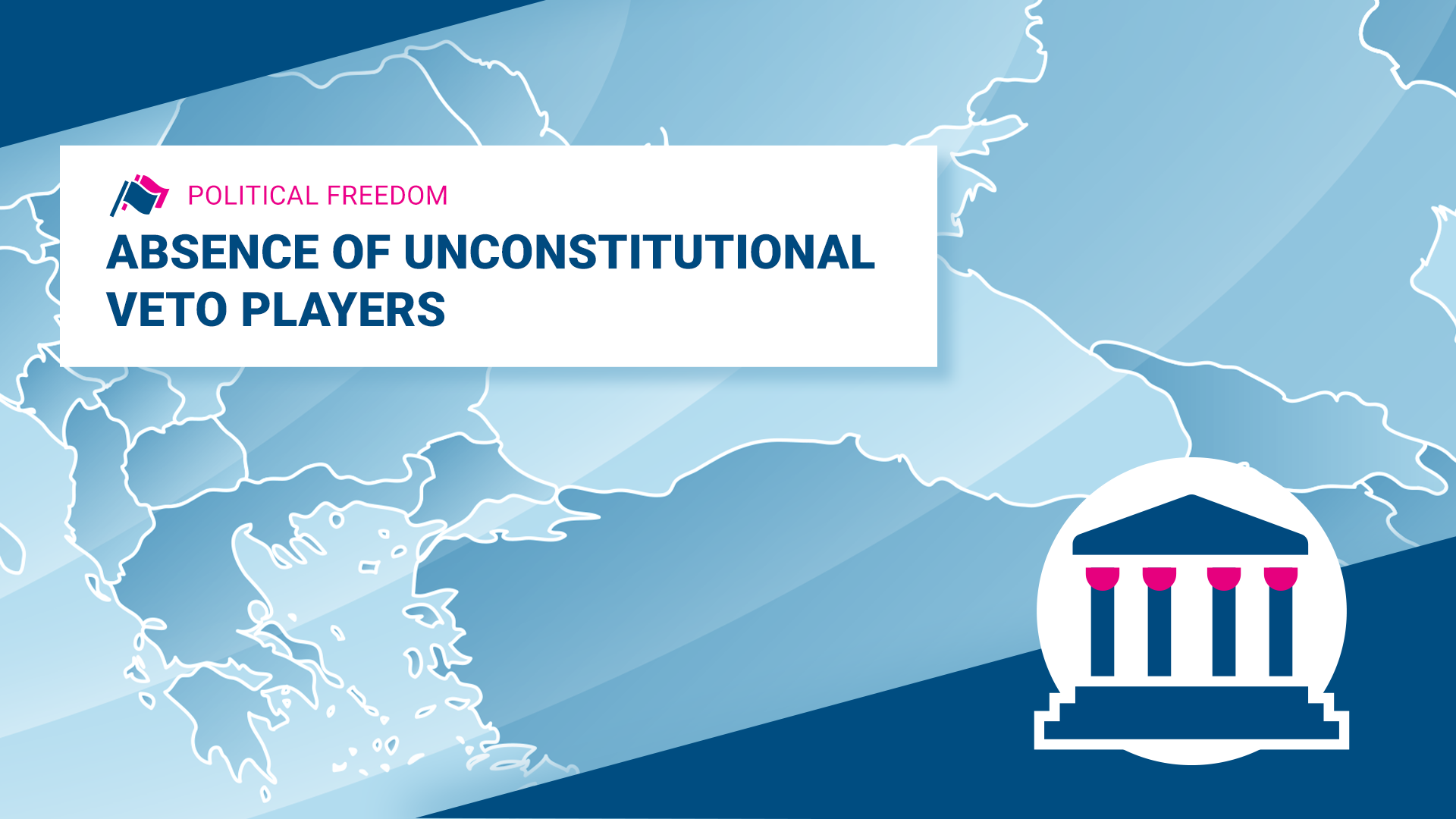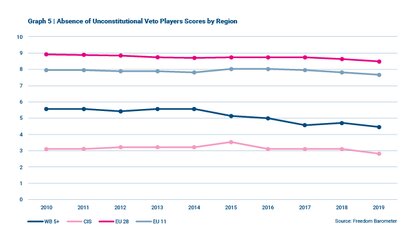Freedom Trends
Absence of Unconstitutional Veto Players: 10 Years Freedom Barometer

Absence of Unconstitutional Veto Players
©Though the name of this political-freedom indicator suggests absence, the trajectories of the data below show an increased presence of Unconstitutional Veto Players all over Europe. Before we continue analysing how this indicator is reflected in various European regions, it is necessary to understand its meaning.
ABSENCE OF UNCONSTITUTIONAL VETO PLAYERS IS A POLITICAL-FREEDOM INDICATOR THAT TRIES TO DETERMINE HOW MUCH PLAYERS IN SOCIETIES ARE ABLE TO INFLUENCE POLITICAL OUTCOMES, NARRATIVE, AND DECISION-MAKING FROM OUTSIDE OF A REAL POSITION OF POWER AS DEFINED BY THE COUNTRY’S CONSTITUTION.

Absence of Unconstitutional Veto Players Scores by Region
These players are there to undermine democratic institutions and the decision-making process, weaken the system of checks and balances, and hinder constitutional arrangements. However, their success and means depend on – and vary from – the democratic development of the country.
There are many players that fall under this definition, whose impact differs from country to country, such as clergy, military or other security forces, and wealthy oligarchs or business elites. However, if we consider that their influence is slowly diminishing, it brings up a question – How come, then, that these freedom trajectories are going down?
A RISE OF AUTOCRATIC TENDENCIES EMPOWERED ELECTED POLITICAL LEADERS TO A LEVEL WHICH ALLOWS THEM TO ABUSE CONSTITUTIONALLY GRANTED POWER AND BECOME A MAJOR CHALLENGE TO THE RULE OF LAW AND DEMOCRACY IN THIS DECADE.
Tajikistan, Azerbaijan, Russia, Turkey and Kyrgyzstan are considered ‘captured states’, with ruling families and/ or entrenched political elites holding all power in their hands. Constitutional referendums in Tajikistan, Turkey and Azerbaijan strengthened the position of presidents and ensured prospects for even longer rule by the families and politicians in power, further shrinking the space for democracy. “The threat of interference into our country’s politics” is a common reason given by Russian politicians when introducing new laws that extend the control of state institutions over society, deliberately adopted so as to suppress even the slightest critical voice.
Similar behaviour in the manner of Vladimir Putin and Reçep Tayyip Erdoğan, although adjusted to the local context, was followed by many strong autocratic leaders from Central and East European countries such as Vladimir Plahotniuc in Moldova, Liviu Dragnea in Romania, Bidzina Ivanishvili in Georgia, Petro Poroshenko in Ukraine, Jaroslaw Kaczynski in Poland, Viktor Orbán in Hungary, and Aleksandar Vučić in Serbia. They’ve used their party positions and strong parliamentary support to dominate the legislative, executive, and judicial branches of power, and thus are in charge of all the country’s most important political decisions. One should bear in mind that Bidzina Ivanishvili, for example, does not hold any office, or that Aleksandar Vučić is in the largely ceremonial presidential position.
All these autocratic leaders understand that the key to control over democratic institutions and decision-making is to neutralize the role of the judiciary as a constitutional controlling and oversight mechanism.
-
Download the full report!